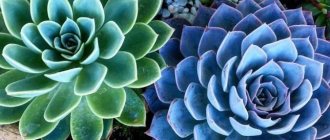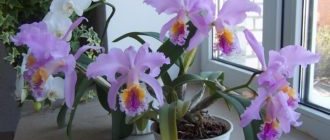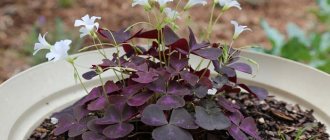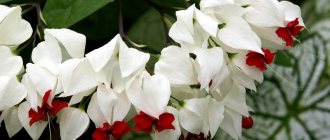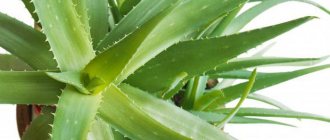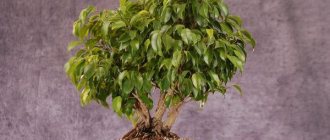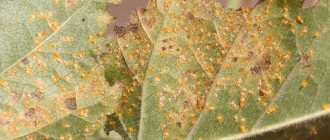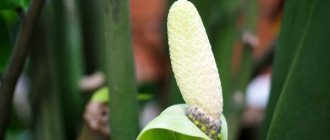Flowers that are not recommended to be kept at home because of their energy
Superstitious people believe that there are plants that, according to popular belief, should not be kept in an apartment. They emit negative energy. Household members' health and mood deteriorate. Sometimes financial problems arise. Flowers that are best avoided to maintain home well-being:
- Sansevieria;
- begonia;
- ivy and other indoor creepers;
- cissus;
- scindapsus.
On a note!
Cacti are plants with controversial effects on others. It is believed that they cannot be grown in the bedroom, as they take away strength from men. But at the same time, cacti are able to attract negativity. Therefore, it is recommended to grow them in pots in other rooms of the house where there is a computer.
Pike tail
Sansevieria is one of those flowers that bring misfortune to the house. Growing it in an apartment, according to popular belief, is a bad idea. This plant is also called “mother-in-law’s tongue.” The energy of a flower brings discord into relationships and prevents them from being harmonious. Therefore, it is not worth keeping it in the house where the newlyweds live.
Ivy
According to signs, this house plant cannot be grown in an apartment. It attracts troubles and misfortune. Unmarried girls are especially not advised to keep ivy. According to legends, it is classified as a “husband flower.” But outside the home, climbing crops protect against problems.
Scindapsus
The plant is also classified as a house flower, which is recognized as a "husband". Scindapsus, or “devil’s ivy,” not only scares away potential suitors, but also provokes quarrels in an already established family. It cannot be planted in the house. It can force the husband to leave and contributes to conflicts with relatives.
Cissus
This is a tropical plant, which, due to the shape of the foliage, is also called the “birch” flower. It is often used by designers for room decoration. However, cissus has extremely unpleasant negative properties:
- It sucks a person's vitality, which leads to frequent illnesses.
- Like other loaches, it is credited with “husband-mongering” properties.
- Pregnant women should not be near cissus. According to legends, the umbilical cord can wrap around the neck of an unborn child.
- In the old days it was believed that if you fell asleep next to it, it could strangle a person.
On a note!
Such superstitions are the result of the vine’s resemblance to a snake and the negative characteristics that were attributed to them.
Adenium
Most of the signs and superstitions associated with adenium are associated with the properties of this plant. Beliefs say that this “desert rose” should not be kept in the house due to health risks. The plant is poisonous. Its juice can penetrate the body through the pores and cause serious intoxication.
Dangerous neighbors
As for energy, the advice to get rid of stunted and diseased plants in a timely manner is psychologically justified. Few people will feel better at the sight of a dying plant. If for some reason it was not possible to keep it healthy and strong, then the best solution would be to give the plant to someone who will properly put it in order.
Poinsettia, akalifa, codium, philodendron, calla, and aglaonema have similar properties. Their juice irritates the skin and mucous membranes of the mouth and eyes, and if it enters the intestines, it causes nausea, diarrhea and vomiting. Hyacinth, clivia, and hippeastrum are especially poisonous in this regard.
Other representatives of this Kutrov family have a similar effect: Pachypodium, Dipladenia, Periwinkle, Adenium. Why can't they be kept at home? These indoor plants contain poison that weakens the heart activity of humans and animals.
Very intensely toxic compounds are released during plant care (watering, spraying, propagation).
If you decide to grow these indoor plants in your apartment, remember first aid measures.
Knowing which house plants cannot be kept at home, you can anticipate many unpleasant situations related to the health of family members.
Plants that are recommended to grow indoors
The opinion that every home must have plants is due to their properties. They release phytoncides and emit positive energy. If you take care of them and place them correctly in the interior, they will attract good luck, prevent conflicts and decorate your home environment.
Chinese rose
These flowers bloom very beautifully, which is why many housewives love them so much. There are many superstitions associated with the Chinese rose in the home. Hibiscus should be grown for girls who want to get married, and for older women - for rejuvenation. For spouses - to add to the family or to add new passion to their relationship.
Crassula
This Crassula succulent attracts wealth to the home. Because of the coin-like appearance of the leaves, the plant is called the “money tree.” In order for the fat plant to improve the financial situation of the family, it must be grown in a red, black or green container, and 2-3 coins should be placed at the bottom of the pot. Ideally, you should not buy such succulents, but pinch off a shoot from rich people.
Crossandra
This plant is an indicator of places with negative energy. Because of this, the crossandra is often placed near the bed. When it starts to hurt and gradually dies, you need to move the bed to another place. If a flower in your house constantly withers, you should think about changing your place of residence.
Spathiphyllum
It is also called “women’s happiness” and is offered to grow for those who are single and want to get married. If you place spathiphyllum in the house, a loving person will soon appear there. Mutual understanding will improve in the family. Spouses who have wanted to have children for a long time will soon have them.
Anthurium
This indoor plant is also called “male happiness.” Anthurium attracts good luck to a man, ensures peace of mind and helps to quickly find his beloved. It is recommended to place it in the marital bedroom to bring back the faded passion in the relationship. At the same time, anthurium helps fill the home with positive energy.
On a note!
Anthurium is a paired indoor flower for Spathiphyllum.
Haworthia
This plant is considered the protector of happiness in the home. They say that haworthia, like an anchor, holds positive energy. Such flowers do not grow and remain small. And if the haworthia begins to get sick, fade and gradually die, this indicates a difficult atmosphere in the house.
Epiphyllum
Popular superstitions say that this plant acts as a “guard” against troubles at home. If it blooms, this is a sign of an imminent addition to the family. And if the florist is lonely, he will soon meet his love. But you cannot give or give away epiphyllum. It prevents unmarried girls from finding a groom and also leads to separation.
Roses
Roses create a good atmosphere in the house, and when the flower is red or pink, then if you make a garland of 32 petals and place it above the marital bed, this will help you have children. But only those flowers that have been growing in the house for at least a year are suitable for this. Rose is a good indicator of relationships. If the plant begins to wither for no reason, this signals imminent family problems.
Oxalis
Oxalis, or four-leaf oxalis, is considered a symbol of good luck. It is often scammed by single women to find a mate. If oxalis grows in the home of spouses, it helps them maintain good relationships and keep family ties strong.
Calathea
This plant is considered the guardian of marriage bonds. Calathea protects spouses from troubles and conflicts, helps their relationships be harmonious. With his appearance in the house, studies go better, and there are fewer family disagreements. Older people feel younger. It gives confidence and firmness to actions. But this flower cannot be thrown away. Otherwise, he will leave all the negativity collected earlier in the house.
Pachira
Pakhira endows those living in the house with health, wealth and luck and protects the home from troubles. This tree cannot be given or transferred to anyone. In this case, all other flowers in the house will not be able to bloom. If you still need to give the flower, then take a coin or some other thing in return.
Nolina (bocarnea)
This unusual-looking indoor palm tree brings positive changes to the lives of those who grow it. Due to its bizarre shape, reminiscent of an elephant’s leg, the flower has gained popularity among gardeners. It suppresses unreasonable outbursts of anger and aggression. Therefore, it is recommended to place it in rooms where many people gather. There the positive influence of the flower will be most pronounced.
Dicentra is magnificent
Due to its specific appearance, this flower is called “broken heart”. Dicentra magnificent has a positive effect on a person. By placing it in the room, a guy or girl who wants to find their lovers will do it faster.
On a note!
There are many romantic legends about dicentra, in which it helps people find their love.
Gloxinia
Gloxinia is important for the atmosphere of the home. It has a positive effect on family relationships. When the flowers are blue, they help develop a person's creativity. Red or pinkish shoots distract from everyday and financial problems. White blooming gloxinia cleanses the house of negativity. And purple has a calming effect and helps prevent minor quarrels.
Bougainvillea
Bougainvillea will bring wealth and prosperity to your home. This container plant also helps people achieve career heights and become successful in life. At the same time, bougainvillea is credited with the properties of a “protector”. According to legends, this flower protects from ill-wishers and envious people.
Plants for a children's room
You may be interested in: How to correctly make a wish so that it comes true What does it mean for a woman to see red tomatoes in a dream What date is Epiphany for Orthodox Christians in Russia in 2022
In a children's room you should not keep plants with a pronounced and specific aroma. They can provoke allergies in a child. It is better to choose indoor flowers for the children's bedroom that emit phytoncides. They purify the air from bacteria, viruses and other dangerous compounds. Such plants include:
- chlorophytum;
- Kalanchoe;
- aloe;
- Usambara violets;
- lemon;
- mandarin;
- myrtle;
- gasteria;
- eucalyptus.
It is not recommended to leave plants that are classified as poisonous crops in the children's room. It is also not recommended to place container flowers in the child’s bedroom, which are highly susceptible to damage. Children can accidentally “injure” a flower and it will die.
Should you keep artificial flowers at home?
It is not recommended to keep artificial flowers, especially climbing ones, in the house. Their energy is not suitable for humans. They make the relationships of the people living in it artificial and complex. All emotions will feel fake. The positive energy that fills the space will be absorbed by artificial plants.
On a note!
Signs about artificial home plants say that man-made ivy, blizzard and philatik bring diseases. If someone gives you such flowers, then perhaps they want to put the evil eye on you.
According to popular belief, there are flowers that bring happiness to the house. There are also those who take away positive energy. Although these superstitions have no scientific basis, some gardeners do not risk growing such plants. When choosing them, you should first of all proceed from the beneficial properties that they possess. The aesthetic component is also important. Properly selected indoor plants will add warmth and comfort to your home environment, and closeness and harmony to family relationships.
Caution required
The list of not the most useful plants needs to be supplemented. Some are not particularly dangerous. But under certain conditions they can cause harm.
List:
- Lily releases a lot of carbon dioxide at night. It is prohibited to keep in the sleeping room.
- The fern also “breathes” in the dark. Your head will hurt in the morning.
- Ficus is harmful to allergy sufferers.
- Hydrangea is too fragrant. Over time, it provokes the development of allergies.
- Tuberose is contraindicated for heart patients and hypertensive patients.
- Geranium can cause an asthma attack.
- Crassula contains arsenic. An overdose during treatment impairs consciousness.
- Dracaena is slightly toxic. It is advisable not to eat it.
